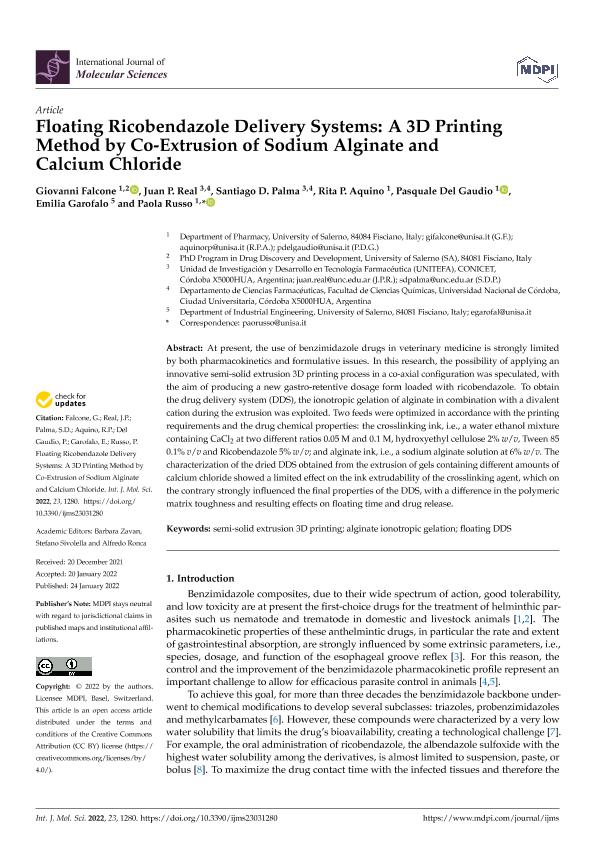Artículo
Floating ricobendazole delivery systems: A 3D printing method by co-extrusion of sodium alginate and calcium chloride
Falcone, Giovanni; Real, Juan Pablo ; Palma, Santiago Daniel
; Palma, Santiago Daniel ; Aquino, Rita P.; Del Gaudio, Pasquale; Garofalo, Emilia; Russo, Paola
; Aquino, Rita P.; Del Gaudio, Pasquale; Garofalo, Emilia; Russo, Paola
 ; Palma, Santiago Daniel
; Palma, Santiago Daniel ; Aquino, Rita P.; Del Gaudio, Pasquale; Garofalo, Emilia; Russo, Paola
; Aquino, Rita P.; Del Gaudio, Pasquale; Garofalo, Emilia; Russo, Paola
Fecha de publicación:
02/2022
Editorial:
MDPI
Revista:
International Journal of Molecular Sciences
ISSN:
1422-0067
e-ISSN:
1422-0067
Idioma:
Inglés
Tipo de recurso:
Artículo publicado
Clasificación temática:
Resumen
At present, the use of benzimidazole drugs in veterinary medicine is strongly limited by both pharmacokinetics and formulative issues. In this research, the possibility of applying an innovative semi-solid extrusion 3D printing process in a co-axial configuration was speculated, with the aim of producing a new gastro-retentive dosage form loaded with ricobendazole. To obtain the drug delivery system (DDS), the ionotropic gelation of alginate in combination with a divalent cation during the extrusion was exploited. Two feeds were optimized in accordance with the printing requirements and the drug chemical properties: the crosslinking ink, i.e., a water ethanol mixture containing CaCl2 at two different ratios 0.05 M and 0.1 M, hydroxyethyl cellulose 2% w/v, Tween 85 0.1% v/v and Ricobendazole 5% w/v; and alginate ink, i.e., a sodium alginate solution at 6% w/v. The characterization of the dried DDS obtained from the extrusion of gels containing different amounts of calcium chloride showed a limited effect on the ink extrudability of the crosslinking agent, which on the contrary strongly influenced the final properties of the DDS, with a difference in the polymeric matrix toughness and resulting effects on floating time and drug release.
Archivos asociados
Licencia
Identificadores
Colecciones
Articulos(UNITEFA)
Articulos de UNIDAD DE INVESTIGACION Y DESARROLLO EN TECNOLOGIA FARMACEUTICA
Articulos de UNIDAD DE INVESTIGACION Y DESARROLLO EN TECNOLOGIA FARMACEUTICA
Citación
Falcone, Giovanni; Real, Juan Pablo; Palma, Santiago Daniel; Aquino, Rita P.; Del Gaudio, Pasquale; et al.; Floating ricobendazole delivery systems: A 3D printing method by co-extrusion of sodium alginate and calcium chloride; MDPI; International Journal of Molecular Sciences; 23; 3; 2-2022; 1-14
Compartir
Altmétricas



